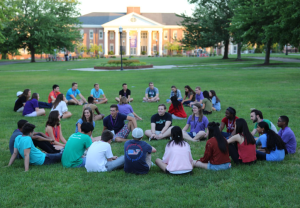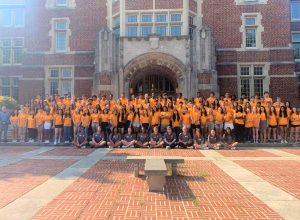Is Artificial Intelligence Taking Over?
Original Artwork for the Herald
March 10, 2023
Buzz! Ding! Ring! The vibrating buzz of a received message, the tone of a notification, and the resounding ringing of an incoming call are sounds of modern technology that reverberate throughout all facets of society. Social media takes prominence in modern-day communications with friends, family, and the world. The internet has altered the landscape of society, and now, artificial intelligence might do the same. The rise of AI-powered tools such as ChatGPT and Dall-E have raised concerns about job security, data privacy, ethics and reliability. On the other hand, these tools may also present many benefits in work efficiency, the reduction of human error, and availability.
In recent months, ChatGPT has taken the internet by storm. According to ChatGPT itself, it is an “advanced AI language model created by OpenAI, capable of generating human-like text based on patterns learned from vast amounts of data”. To put it simply, it is an application that can respond to messages in a human-like way. Before ChatGPT, Dall-E, a similar AI-powered tool also from OpenAI, sparked conversation across the internet. Instead of responding to messages with text, Dall-E responded to them with AI-generated pictures. However, unlike Dall-E, ChatGPT has proven to be more capable, accessible, and adaptable. As a result, ChatGPT has remained the primary talking point of AI development.
STEM teachers and students at Science Hill have a lot to say on artificial intelligence. Mr. Gentry, who teaches STEM classes, expressed some reservations. “Some concerns I have are for employment, especially in regards to low-skilled jobs. he says. The reliability of AI-generated data also presents concerns. He explains, “Programs like ChatGPT can create written works that appear to be written by a human. The concern here is that the information may not be accurate or reliable, and that the work could be presented as being from someone when it was actually written by the bot.”
Data privacy proves to be a major worry too. Mrs. Andrews, a computer science teacher, says, “There’s definitely some data privacy threats you will see in AI. Unfortunately, sometimes people let their guard down, even on a computer, and may give personal information”. She emphasizes that no one really knows where the data goes or what is done with it.
Mr. Gentry shared the same worry, but he explained that ethics was another problem. “These machines have no emotion or morality in their decision making. Whereas humans can use emotion, morality, and judgment to make decisions, AI systems are cut and dry,” he says.
Still, there are countless benefits to AI technology. Allen Feng, president of Coding Club, explains that this technology will allow people to focus on their real passions. He states, “We will inevitably create many AIs to perform menial tasks so that we can move on to more important matters”.
Brayden O’Neil, a member of the Robotics Club, agrees. “AI tools are useful because you can substitute them in for a lot of the repetitive and lengthy tasks.”
In addition to performing repetitive tasks, Mr. Gentry lists other benefits for AI: reducing human error, providing 24/7 availability, making unbiased decisions, and reducing risk for humans in dangerous situations. Mrs. Andrews also describes another case for AI bots: companionship. “Someone needed to talk out something that they couldn’t talk out with someone. You can talk through an artificial intelligence bot, and therefore, kind of work out something if you don’t have access to someone else”.
In addition to its broad social implications, AI could more specifically alter schoolwork and academics. First, artificial intelligence introduces a new concern for cheating. Mrs. Andrews states, “In an academic setting, you’re now looking at a new way to cheat. Teachers and educators will need to look around and [determine] how to assess [these issues].”
Still, if utilized appropriately, Mr. Gentry and Mrs. Andrews both believe artificial intelligence could help students with learning. For instance, Mr. Gentry states, “I could see AI being used to generate questions that help students study for tests, give guidance for homework, and even create ACT and SAT type practice tests”. However, he also believes this technology could help teachers. “I could see teachers using AI to do many of the same things listed above such as creating test questions, homework assignments, and even providing scaffolded support for students who are struggling with content. I don’t believe AI will replace high quality teachers, but it can certainly be utilized to improve teaching and learning.”
Artificial intelligence might be the next technological revolution, or it could be a short-lived fad. In regards to the future of AI, Mr. Gentry responds, “There have been many technologies that were going to revolutionize the world that soon fizzled out, so I think it is hard to predict the total impact that AI will have. I do believe that AI will continue to advance, and as it advances, it will play a much more significant role in our lives.”
Mrs. Andrews states, “Right now, I don’t see AI being as big of a thing as the internet was, but certainly in years to come, we’ll see a rapid rise in AI things showing up around the world.”
Regardless of the future of AI, computing and digital technologies will continue to dominate the world, so exploring STEM careers will ensure that you do not stay behind in the fast-moving world. Fortunately, Science Hill offers several opportunities to explore STEM!
“Science Hill offers a STEM program of study in CTE that covers everything from engineering/manufacturing to circuit design and robotic building/programming. There are also after school robotics and coding clubs that are geared toward STEM,” says Mr. Gentry.
Allen Feng, president of Coding Club, adds, “I’d encourage anyone with an interest in a STEM career to double up on math and/or science for at least a couple years. Of course, since we’re talking about AI, I should probably mention that AP Computer Science (Principles or A) is also a great choice”.
Mrs. Andrews suggests students talk to their counselors and STEM teachers, and she also comments, “[Students are] welcome to come talk to me about Computer Science!”
With a plethora of resources at their fingertips, Science Hill students are poised for great success in this new technological age.













